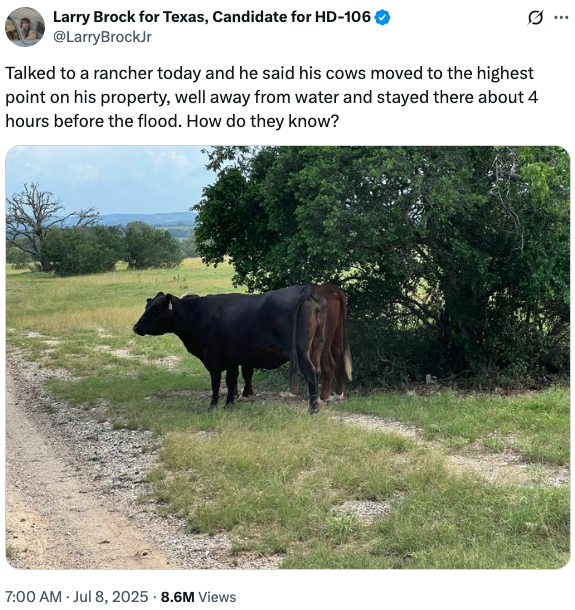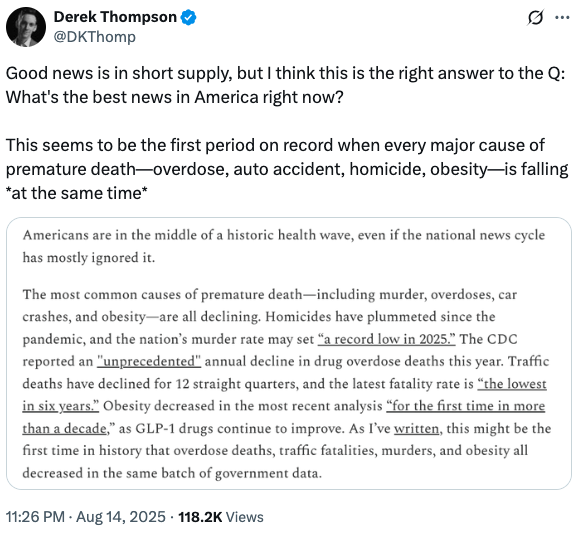Landon Donovan’s new hair, and the side effect he wasn’t expecting (NYT): As a man of a certain age, this hit a little too close to home. But, hats off (heheh!) to the man for having the courage to participate in a story like this. Making the world a hair safer for the rest of us.
Donovan’s journey to a hair system started two decades ago when, as a 20-year-old, he noticed his hair was receding. He remembers one moment when he was warming up for a game against FC Dallas in Frisco and fans started chanting at him: “Rogaine! Rogaine!”
-
Working through the consequences of this, it is not difficult to see why the left has been unable to get much traction out of these changes, especially in developed countries. People are not rebelling against economic elites, but rather against cognitive elites. Narrowly construed, it is a rebellion against executive function. More generally, it is a rebellion against modern society, which requires the ceaseless exercise of cognitive inhibition and control, in order to evade exploitation, marginalization, addiction, and stigma. Elites have basically rigged all of society so that, increasingly, one must deploy the cognitive skills possessed by elites to successfully navigate the social world. (Try opening a bank account, renting an apartment, or obtaining a tax refund, without engaging in analytical processing.) The left, to the extent that it favours progress, is essentially committed to intensifying the features of the modern world that impose the greatest burdens of self-inhibition on individuals.
Seeing things in this way makes it easier to understand why people get so worked up over seemingly minor issues, like language policing. The problem with demanding political correctness in speech, and punishing or ostracizing those who fail, is that it turns every conversation into a Stroop test, allowing elites the opportunity to exhibit conspicuous self-control. It requires the typical person, while speaking, to actively suppress the familiar word that is primed (e.g. “homeless”), and to substitute through explicit cognition the recently-minted word that is now favoured (e.g. “unhoused”). Elites are not just insensitive, but positively dismissive of the burdens that this imposes on many people. As a result, by performing the cognitive operation with such fluidity, they are not only demonstrating their superiority, they are rubbing other people’s faces in it. (From this perspective, it is not surprising that the demand for “they/them” pronouns upset some people even more, because the introduction of a plural pronoun forces a verb change, which requires an even more demanding cognitive performance.)
-
Everyone under 30 is prematurely old (worried about savings, career, FIRE).
Everyone over 50 is desperately young (Burning Man, psychedelics).
My theory: Information abundance aged the young by showing them all future problems all at once.
Information abundance also made the old young by showing them all missed experiences all at once.
So now Gen Z talks like retirement planners and boomers act like teenagers.
It's so over.
The Remains of the Day and the movie:
I recently read The Remains of the Day by Kazuo Ishiguro, after coming across a positive review and remembering that there was an Oscar nominated movie based on the book in the '90s, when watching the Oscars used to be in thing in India.
After the first couple of chapters, thinking that this was perhaps an artsy book, I also opened up a chat with ChatGPT to improve my understanding of the book.
This was useful but note to self: in future explicitly tell ChatGPT to avoid spoilers or otherwise reveal information or conclusions from the later chapters. To be fair, I did ask for themes to notice in rest of the book so its mostly on me.
This isn't a thriller so in one sense the damage was limited. It is, however, a very subtle book that gradually unveils its layers and getting a bunch of bullet points upfront, spelling out every complexity and nuance wasn't ideal.
The book is a masterpiece. Very few books have ever had this effect on me where, for days afterwards, I suddenly get a flash of feeling, a pang that forces me to stop for a breath.
The closest analogy that came spontaneously to my mind was of eating great Japanese food (yes, even as a vegetarian) - the flavours are extremely subdued - very much the opposite of, say, Indian food. But they are unmistakable, sharp even, if you stop and notice, and you know it took a lot of effort and craftsmanship to pull it off just right.
When reading fiction, I have a tendency to really flip pages towards the end, a tendency developed from years of reading mostly thriller novels. Because of this I found the book depressing, having barely spent any thought on the final pages. It is only while writing this post that I revisited the ending (and the title) and had to reconsider my understanding.
I had identified so deeply with the sense of loss in the middle of the book that I completely missed the gentle ray of hope that Ishiguro leaves us with at the end: as humans, on any given day and at any given time, all we can do is to make the best of whatever remains of the day.
Highly recommended.

